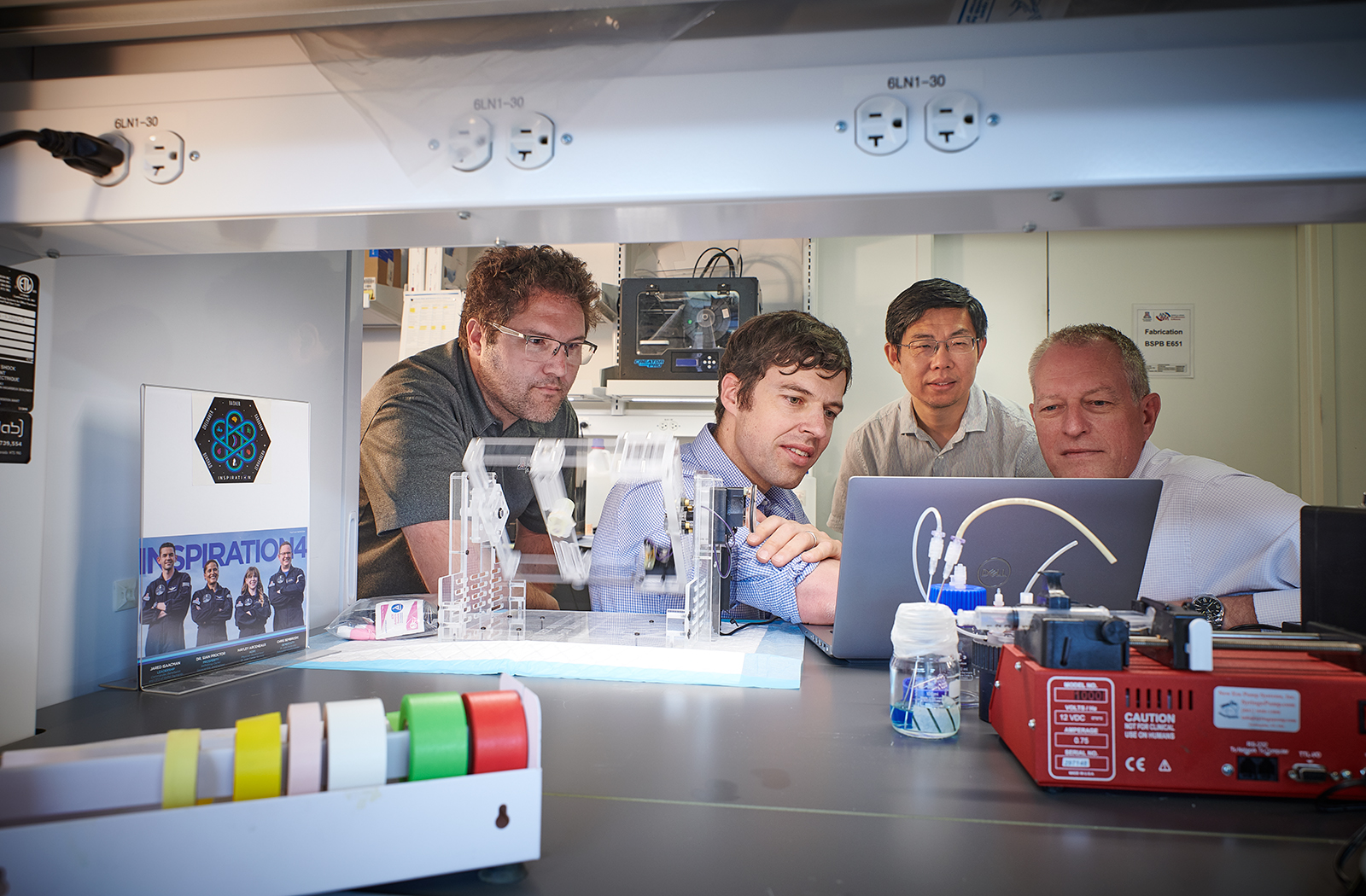Their research showed that short-duration space missions do not pose a significant health risk
When SpaceX’s Inspiration4, the world’s first all-civilian mission, successfully orbited earth, the potential for future commercial space travel became real.
During that mission, the VeriFAST Platform was deployed to monitor the crew members’ stress, inflammation and immune levels. The novel technology — developed by researchers with the Center for Applied NanoBioscience and Medicine (ANBM) at the University of Arizona College of Medicine – Phoenix — performed rapid assessments of the physiological and molecular effects of time spent in space.
“Our team had been developing the multiplex Vertical Flow Immunoassay under an OTA product development contract with Department of Defense/Defense Threat Reduction Agency for mobile biothreat detection. When the COVID-19 pandemic hit, NASA TRISH sponsored our effort for quickly adapting the technology into a handheld device and designing panels of antibodies for home testing,” Frederic Zenhausern, PhD, MBA, director of ANBM, explained. “We were then invited to join the teams selected by NASA and SpaceX to develop a set of technologies to be tested by the Inspiration4 crew during the flight mission.”
“That is how we had to design, prototype and test a special diagnostics kit suitable for spaceflight certification in about 10 months. Our team was also coordinating the specifications and collection of saliva and blood specimen suitable for multi-omics analyses at multiple sites,” Dr. Zenhausern continued.
The results the device provided for future space tourism were encouraging. Through post-flight experiments, the results showed that crew members’ vitals after the three-day space flight mission did not differ from baseline (pre-flight) when they returned to Earth. Findings from the Inspiration4 experience were part of a suite of scientific reports published in Nature June 11 that examined the effects of spaceflight on people with diverse medical histories.
This comprehensive package of manuscripts, data, protocols, and code is the largest compendium of information on aerospace medicine and space biology; and it comes from the work of more than 100 institutions in nearly 30 countries.
Their paper, Molecular and physiologic changes in the SpaceX Inspiration4 civilian crew, had three main objectives: evaluate the feasibility of collecting biological and behavioral data in an all-civilian crew throughout the phases of the spaceflight mission — pre-, in- and post-flight; examine the biological and behavioral responses of the crew to short-duration orbital spaceflight; and build the foundation of a biomedical database, enabling access to these biomedical data from the crew and mission.
The scientists analyzed dried blood spot samples that four astronauts collected before, during and after their spaceflight. They used a high-dimensional genomic assay to monitor antibodies against 80 different viruses from these small samples, detecting stable antibody levels against many viruses, indicating previous exposures.
However, they also observed changes in some antibody levels around the time of the flight, especially those targeting Epstein-Barr Virus (EBV). This suggests increased activity of EBV, which usually stays dormant but can reactivate under stress. The stress of spaceflight and microgravity might explain these changes. It is important to note that this study had a small sample size, so further research is needed to confirm and expand these findings.
Their hope is that the data will inform the development of future countermeasures for both private and government-sponsored space missions.
Jerome Lacombe, PhD, was a co-first author on the paper — which included contributions from other members of ANBM, including Jian Gu, PhD, an associate research professor, AJ Summers, a Clinical Translational Sciences PhD student, and John Altin, PhD, an associate professor with the Translational Genomics Research Institute (TGen).
Dr. Lacombe discussed the potential impact their work may have on the future of commercial space travel. “The take home message is that space travels trigger changes in our organism, but that these changes seem to not be irreversible — at least for short trips. With the expected increase of commercial spaceflights, we hope to collect more data to confirm these results and better understand the underlying mechanisms,” he said. “This mission also gave us a lot of important information for the development of our vertical flow immunoassay. This is maybe more for long-duration space missions and the need of an autonomous medicine, but it also has a tremendous impact for personalized medicine and many applications on Earth.”
Dr. Zenhausern served as a co-senior author on the paper. He noted how these results will help inform the future of their device development, as referenced in Nature’s How a few days in space can disrupt a person’s biology. “Our team is continuing its research work in space medicine and other clinical applications by pursuing further development broadening the combination of genes and proteins assays onto a simple home kit,” Dr. Zenhausern said.
“The goal is to make a diagnostic kit accessible to everyone — for use either in space or on Earth,” Dr. Lacombe added.
“It’s thrilling to be part of this study. We anticipated that our tools for extracting large amounts of information from small, self-collected blood samples would enable unique field studies; but we never expected to use these methods in orbit. Their success boosts our confidence in deploying them on a larger scale in future missions, helping us better understand how spaceflight affects the interaction between microbes and the immune system,” said Dr. Altin.
Media Contacts
Thomas Kelly
Associate Director, Public Affairs
University of Arizona College of Medicine – Phoenix
Galen P. Perry
Sr. Vice President, Marketing & Communications
TGen

